- R.A
- information
- 4863 views
- 0 comments
Omar Khayyam was a Persian poet, mathematician, and astronomer who lived from 1885 to 1909 in Neyshabur. Neyshabur is a city in Khorasan province, and the tomb of Ferdowsi, a great Persian poet who wrote Shahnameh, is there too. Omar Khayam was most renowned for his pioneering work as a scientist; Khayyám gained knowledge in several fields, including geometry, algebra, and physics. Additionally, he discovered that earth-centric theories of the cosmos were fundamentally wrong, revolutionizing the field of astronomy. Please stick with us to know more about Khayyam.
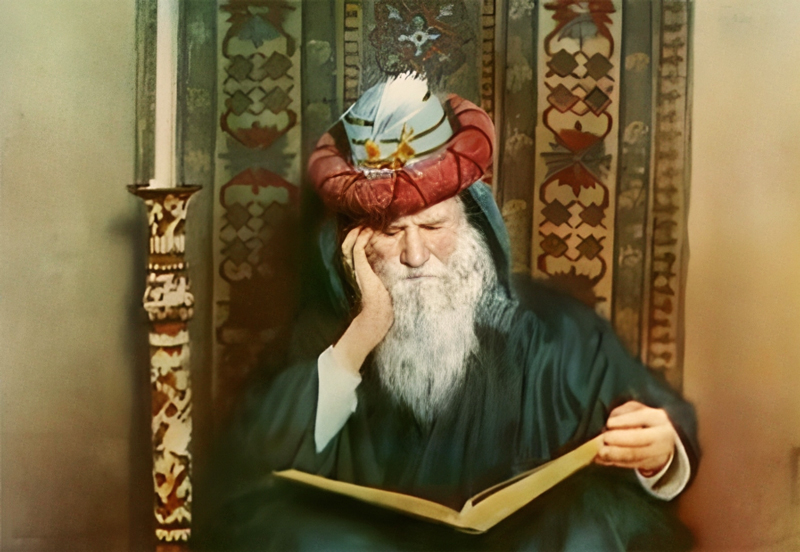
Lasting Achievements of Omr Khayam
In this part of the CyrusCrafts, we will answer this question who is omar Khayyam? And talk about the achievements of the famous Hakim Khayyam Neyshaburi, including his works on mathematics, astronomy, music, and literature.
Mathematical theories by Omar Khayyam
You may wonder why most Iranian scholars and poets were interested in science and mathematics.
Khayyam's works in mathematics (especially algebra) were used among European mathematicians in the 19th century. Khayyam's footsteps can be traced through Tusi in the development of mathematics in Europe.
Khayyam was the first to show that a cubic equation may have more than one or no answer. "What happens in each case depends on whether the conic sections he uses do not intersect at any point or at one or two points."
One of Khayyam's other works is Risāla fī šarḥ mā aškala min muṣādarāt kitāb Uqlīdis. Omar Khayyam, in this treatise, studied the theorem of parallel lines, which is the foundation of Euclid's geometry, and proved the fifth principle.
Cyrus Crafts; Luxury & Unique Products
Astronomy By Khayyam
As we said, Khayyam gave Iran's chronology and calculated the earth's orbit around the sun up to 16 decimal places.
Five philosophical treatises have been found from Khayyam, one of which is Persian, and the rest is Arabic.
Omar Khayyam in music knowledge
Khayyam has also studied the mathematical analysis of music. In one of his theories, Omar explains the problem of dividing a quarter into three intervals corresponding to non-half-tone, rising half-tone, and quarter-tone intervals.
Literature & Poems by Omar
Khayyam's contemporaries were unaware of his quaternions and knew him as a mathematician and philosopher. He is mentioned as a poet in a book by Emad al-Din Isfahani, written in Arabic in 572, nearly 50 years after Khayyam's death. Also, many other prominent Iranian poets, such as Jalaluddin Rumi, wrote beautiful and exemplary quatrains.
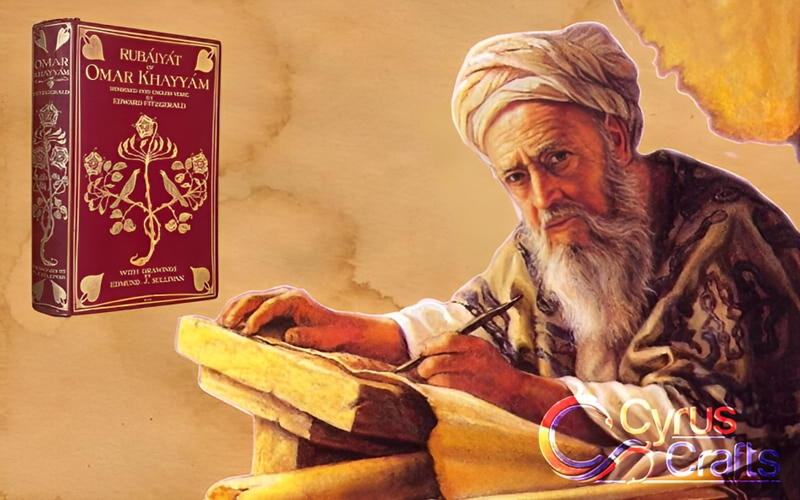
Omar Khayyam's Influence Beyond Earth
Omar Khayyam's legacy extends far beyond our planet, and one of the craters on the moon has been named after him.
- Also, in 1980, The asteroid 3095 was named after Khayyaman, symbolizing his lasting impact.
- Omar Khayyam's name has been embraced in various earthly domains. A hotel in Tunisia proudly bears his name, and France and Egypt have beverages named after him, recognizing his cultural significance.
- Interestingly, Khayyam's influence reaches as far as Ethiopia. In Addis Ababa, the capital city, there is a restaurant named after him, providing a tribute to his enduring legacy. Moreover, the University of Ethiopia library center houses Khayyam's quatrains translated into Amharic, highlighting his literary prominence in diverse languages.
- Recognizing his remarkable contributions, the Omar Khayyam Association was established in London in 1892 by scientists, writers, and journalists. This association held three memorial ceremonies for Khayyam until 1893, commemorating his profound impact on the world.
- Omar Khayyam's influence transcends earthly boundaries, leaving an indelible mark on celestial bodies and human endeavors.
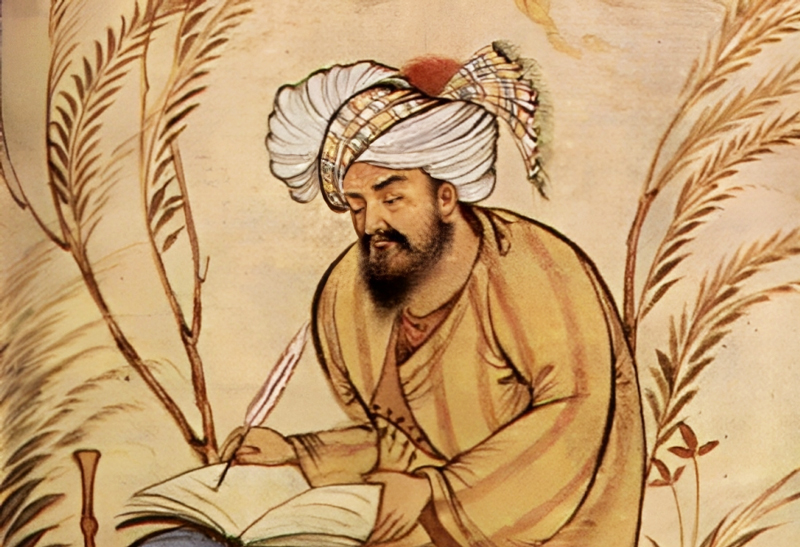
Khayyam's Presence in Movies and Literature
The captivating persona of Khayyam has made its way into various movies and literary works, where he assumes significant roles. Here are some notable examples:
"Omar Khayyam" (1956): This American film is about khayam's biography and his journey to self discovery.
"Inherited: The Legend of Omar Khayyam" (2005): Another American movie delving into his legacy and the impact he left behind.
"The Songs of Khayyam" by Sadegh Hedayat: The book contains three articles about Khayyam and selected quatrains classified according to the topic and omar Khayyam quotes.
"Khayyam and that Heartwarming Lie" by Houshang Moinzadeh: This Iranian novel weaves a tale involving Khayyam, captivating readers with its intriguing narrative and heartfelt deception.
"Samarkand" by Amin Maalouf: Within this novel, Khayyam's presence resonates, adding depth and cultural richness to the story.
"The Story of Masoomah Shirazi" by Mohammad Ali Jamalzadeh: omar khayyam quotes influence is felt within this tale, contributing to its engaging narrative and character development.
One of the most widely published and illustrated poetry books of all time is Edward FitzGerald's Rubaiyat of Omar Khayyam poet. Various versions have been published for over 150 years, and new illustrated versions continue to appear. "The moving finger writes" is one of the most famous poems in this book which was translated by Edward Fitzgerald into English:
The moving finger writes; and, having writ, moves on: nor all thy piety nor wit shall lure it back to cancel half a line, nor all thy tears wash out a word of it.
Additionally, it is worth mentioning that the renowned writer Jack London penned the novel "Sea Wolf," which stands separate from the Khayyam-related works but bears literary significance in its own right.
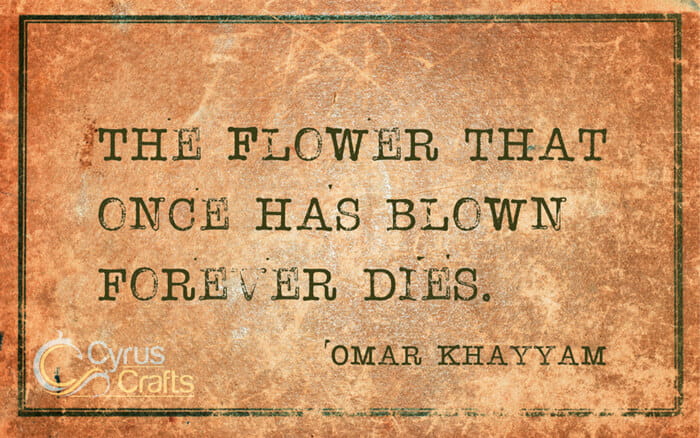
Amber Heard’s Persian tattoo is a phrase by Omar Khayyam
As well as her Spanish and Persian tattoos (also known as Farsi), the American actress wore a Persian headband on the left side of her body. She has another Persian tattoo below the quote by Chilean poet Pablo Neruda. The phrase is attributed to Omar Khayyam, which means "Be Merry Since The Fate Of The World Is Non-Existence."
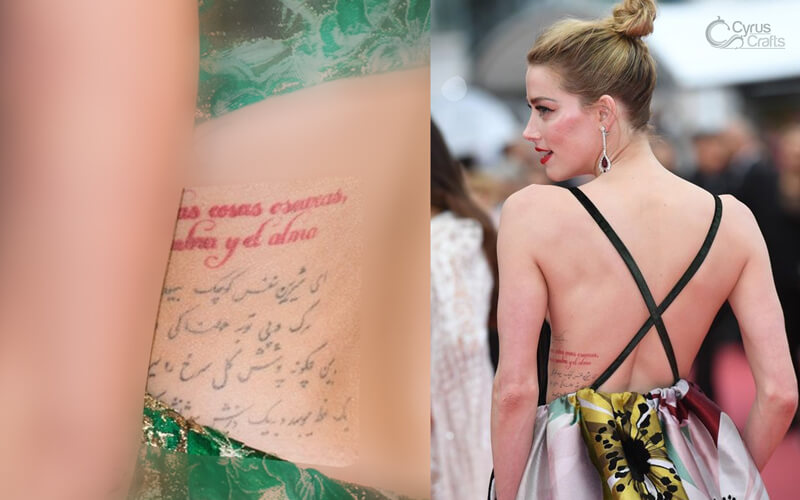
Omar Khayyam Persian calligraphy
With his unique style, Omar Khayyam set a brand-new standard for houses and decorations. Khayyam's poems are decorated with the art of Persian calligraphy and are used as wall panels in decoration. These wall hangings are used in various places such as the workplace or home due to their beauty.
Khayyam's works
If we want to look at the valuable works of Khayyam the All-Knowing, we can highlight a few of them. Of course, it is worth mentioning that some copies of Khayyam's treatises are no longer available and have been lost, or some are kept in museums with manuscripts. Essential works of Khayyam are:
- The Rubáiyát of Omar Khayyám
- The Moving Finger Quatrain
- Theory of parallel
- The solution of cubic equations
- The real number concept
Features of Rubaiyat of Khayyam
Omar Khayyam poems is written as a quatrain or Rubaiyat, with the main theme of doubt and astonishment, attention to death and destruction, and warning about taking human life as a burden. Omar khayyam poems and quotes contain deep philosophical meanings. They result from a great thinker's conscious thought before the great mysteries of creation.
How many Rubaiyat does Khayyam have?
The number of Khayyam's quatrains has been about seventy; so far, more than a few thousand Rubaiyat have been attributed to him. Most of Omar Khayyam poems are in Persian and Arabic.
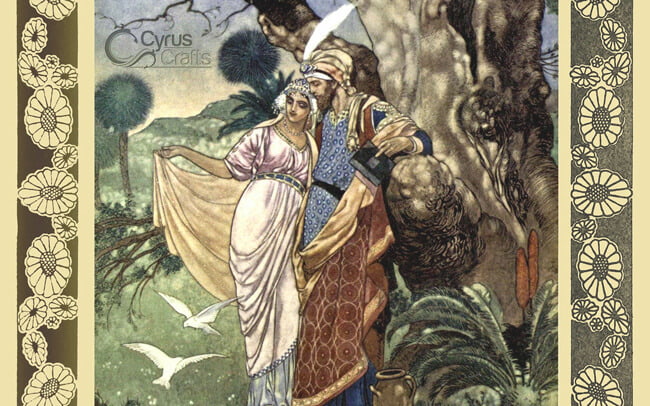
How did Khayyam die?
There are many tales about Ommar Khayam's death, but A famous historical narration narrates that he was studying suddenly on the last day of his life; he turned his head from the book, turned to his son-in-law, and said, "Read the congregation so that I can make a will."
After making the will, he prayed and mentioned in prostration that, God, you know that I have known you as much as I was in my heart, so have mercy on me. After this mention, he surrendered, life after life. This historical narration shows his religious devotion until the last moments of his life.
Tomb of Omar Khayyam
Khayyam in 517 AH. He passed away in the city of Nishabur, and his tomb is currently in the city of Nishabur.
Before his death, he predicted the location of his grave. In his meeting with him, Nizami expressed this prediction: "May my grave be in a position where every spring, the north will throw flowers on me." After four years, Nizami went to the city of Neishabur and visited the shrine of this great poet and saw that his grave was where he had said.
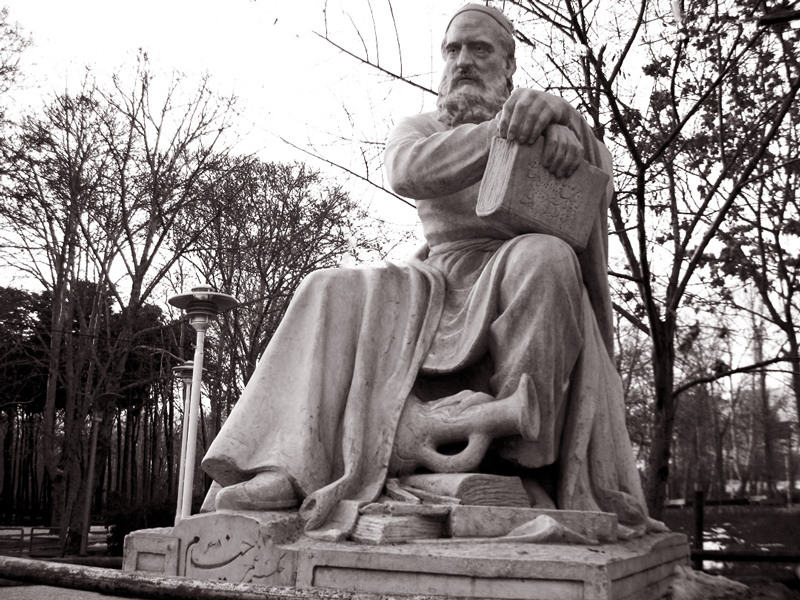
CyrusCrafts’ last point
Currently, the city of Neishabur is not only the resting place of many Iranian poets and philosophers, but it is also full of various crafts. You can find the world's best turquoise stones in this historical city. Also, this city has a lot of visitors from all over the world every year.








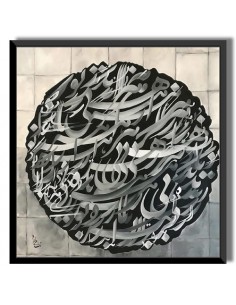

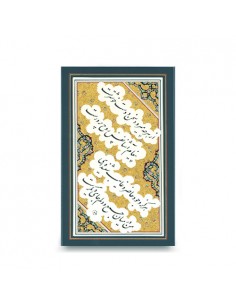



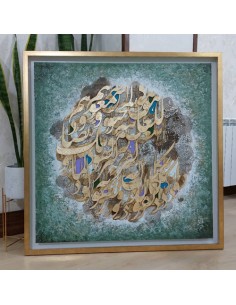

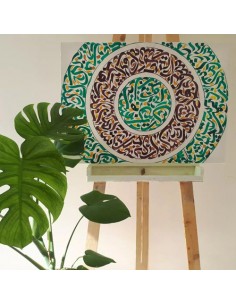

Comments (0)